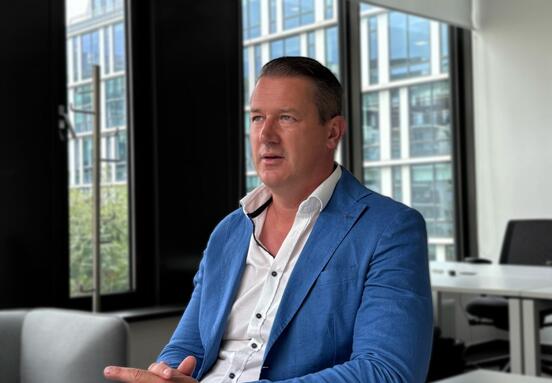- Why did you leave Diófa?
- There is a very intense, successful four-year period behind me. When I got there, I was the one-man property department. The property management team set up on my initiative and now the property and asset management teams have more than 30 experts. I can proudly say that I have a significant part that Diófa has become a major player in the market, we have closed different transaction (sum: 340 million €), and became a renowned company not only for domestic players but also for foreign investors. We have developed Diófa consciously: beyond acquisitions we also put big efforts on asset management. We have built the property management department, and set the foundation for strategic asset management. However I’m sorry that we could not make further steps - due to several factors. I felt myself very good at the company, but this extremely intense period could not last forever. The profile of my newly founded real estate consulting company is still shaping. I do not want to compete with big adviser firms, I’m about to find the kind of activity I want to deal with in the longer term – that motivates me.
- - What do you mean exactly?
- Project management, economic analyzes and feasibility studies. There is also a huge shortage of experienced asset management experts, who are able to make the most of a real estate property in the long run.
- If that kind of knowledge is wanted, you must have had some bids too.
- Yes, there were offers and requests, but temporarily I do not want to take any position like I had. On the one hand, my own company is also a good background to prove my abilities; on the other hand it is a transition period. That’s about filling up, regenerating and learning. I still have some links to Diófa; I work for them as a freelance project management expert on a countryside project, so I spend part of my free time with this exciting work. I can easily imagine that the time for rest will be significantly shortened. Getting back to your question, if I get a serious bid, let’s say in a year, I will think about it. But I have a second option too: If I see significant progress in my own company and could find some suitable companions, I will go further on this way.
- How would you estimate the real estate market? How strong is the recovery?
- I am glad to see that after a long depressive period a large number of sales and rental transactions were closed in the last 2-3 years – I had some parts in it too. However, this intensity can not be sustained forever; I think some bubble is growing (not just on the real estate market). This may cause some smaller corrections, but not as large as we saw in 2008. You may attention for base interest rates; if they rise, the direction of capital investments may also change. This can effect in a rearrangement of portfolios and this may have an impact on the real estate market.
- There is an astonishing rally on the housing market, but the prices of the office market are unchanged. How do you explain this?
- The housing market works a little differently; developers and owners were much better how to sell pricing ideas, meanwhile the customers are less conscious and prudent. In the past year we saw a slight rental price in the office market, but this was really far behind the housing market. It has several reasons: in the case of recently completed developments and previously sold buildings, returns are often calculated on a different basis by investors / developers, so there was no significant pressure to raise rents. Calculating with the "old" conditions, the previous rents could be good for a while. Several owners / developers try to compensate the increase in investment / maintenance costs by the increase in yields (linked with the enhancement of value). They say decline in yields still guarantee the return on the same level. I have also seen many examples in the last years that owners preferring to hang up (technical) renovations; but this have an effect on tenants too. The third factor is that some developers have low-cost resources, which may also help lower rental rates for new buildings. However, these aspects can only counterbalance the pressure on developers / investors for a short time.
- Low cost loans are great, but in the meantime, land prices and construction costs have increased considerably.
- Yes, so I think the rents have to go up. The increase in construction costs is not only a problem for new developments but also for existing buildings. The cost of building of an office space - even if it is only structurally completed - can now reach EUR 300 / m2. With a five-year lease agreement you can not afford to finance increased office building costs under current rental rates and other conditions. For such a contract, it is not unusual that tenant wish to have 150-200 € / m2 contribution for the internal outfit. If you calculate with rent-free period and other benefits than we are talking about a very unfavourable rate of return. This can not be maintained - obviously. For these reasons, I think that for example along the Váci út corridor, the standard bid price will soon be over 15 € / m2 / month.
Irodakereso.info







